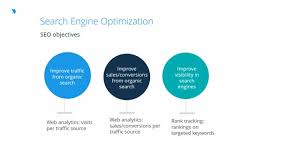SEO 101: A Beginner’s Guide to Search Engine Optimization
Welcome to the world of Search Engine Optimization (SEO)! Whether you’re a business owner, a marketer, or simply curious about how websites rank on search engines, understanding the basics of SEO is essential in today’s digital landscape.
SEO is the practice of optimizing your website to improve its visibility on search engine results pages (SERPs). By implementing SEO strategies, you can increase organic traffic to your site and attract more potential customers.
The Fundamentals of SEO:
Keywords: Keywords are the words or phrases that users type into search engines when looking for information. Conduct keyword research to identify relevant keywords for your website.
On-Page SEO: This involves optimizing elements on your website such as meta tags, headings, and content to make them more search engine-friendly.
Off-Page SEO: Off-page SEO focuses on building backlinks from other reputable websites to improve your site’s authority and credibility.
SEO Best Practices:
- Create high-quality, engaging content that provides value to your audience.
- Optimize your website for mobile devices as mobile-friendliness is a key ranking factor.
- Improve site speed and performance for better user experience and search engine rankings.
- Regularly monitor and analyse your website’s performance using tools like Google Analytics and Google Search Console.
The Future of SEO:
As search engines continue to evolve, staying updated with the latest trends and algorithm changes is crucial. Voice search, artificial intelligence, and user experience are becoming increasingly important factors in determining search rankings.
In conclusion, mastering the basics of SEO is essential for anyone looking to establish a strong online presence. By implementing effective SEO strategies, you can enhance your website’s visibility, attract more visitors, and ultimately achieve your digital marketing goals.
Understanding SEO Basics: Key Questions Answered
- What is SEO and why is it important?
- How does keyword research help in SEO?
- What are the differences between on-page and off-page SEO?
- Why is high-quality content crucial for SEO?
- How can mobile-friendliness impact SEO rankings?
- What tools can be used to monitor website performance in terms of SEO?
What is SEO and why is it important?
Search Engine Optimization (SEO) is the process of enhancing a website’s visibility on search engine results pages (SERPs) through organic (non-paid) strategies. It involves optimizing various aspects of a website, such as content, meta tags, and backlinks, to improve its ranking and attract more relevant traffic. SEO is crucial for businesses and websites as it helps increase their online presence, drive targeted traffic, and ultimately boost conversions and revenue. By appearing higher in search results for relevant queries, websites can reach a wider audience, build credibility, and establish authority in their industry. In today’s competitive digital landscape, understanding and implementing effective SEO practices are essential for long-term success online.
How does keyword research help in SEO?
Keyword research plays a pivotal role in SEO by helping website owners understand the search behaviour of their target audience. By identifying relevant keywords and phrases that users are searching for, website owners can strategically incorporate these terms into their content, meta tags, and headings to improve visibility on search engine results pages. Effective keyword research not only increases the chances of ranking higher for specific search queries but also helps in creating content that resonates with the needs and interests of potential visitors. Ultimately, keyword research acts as the foundation of SEO strategies, guiding website owners in optimising their online presence to attract organic traffic and enhance user engagement.
What are the differences between on-page and off-page SEO?
In the realm of SEO 101, a common query revolves around the distinctions between on-page and off-page SEO strategies. On-page SEO focuses on optimizing elements within the website itself, such as meta tags, content, and internal linking structure, to enhance its visibility and relevance to search engines. Conversely, off-page SEO involves activities conducted outside the website, like building backlinks from authoritative sites and engaging in social media marketing to boost the site’s credibility and authority. While on-page SEO ensures that a website is technically sound and user-friendly, off-page SEO plays a crucial role in establishing the website’s reputation and trustworthiness across the digital landscape. Both aspects are integral components of a comprehensive SEO strategy aimed at improving search engine rankings and driving organic traffic to the website.
Why is high-quality content crucial for SEO?
High-quality content plays a pivotal role in SEO as it serves as the foundation for engaging with both users and search engines. Search engines like Google prioritise content that is relevant, informative, and valuable to users. By creating high-quality content that addresses the needs and interests of your target audience, you not only enhance user experience but also increase the likelihood of ranking higher in search results. Quality content helps establish credibility and authority for your website, encourages organic backlinks from other reputable sites, and ultimately contributes to long-term SEO success by attracting and retaining valuable visitors. In essence, high-quality content is crucial for SEO as it forms the cornerstone of a successful digital marketing strategy aimed at driving organic traffic and achieving sustainable growth online.
How can mobile-friendliness impact SEO rankings?
In the realm of SEO 101, the impact of mobile-friendliness on search engine rankings is a commonly asked question. With the increasing use of mobile devices for browsing the web, search engines like Google have prioritised mobile-friendly websites in their algorithms. Websites that are optimised for mobile devices not only provide a better user experience but also signal to search engines that they are responsive and accessible across different platforms. This can lead to higher search engine rankings, increased organic traffic, and improved visibility in mobile search results. Therefore, ensuring that your website is mobile-friendly is crucial for enhancing your SEO performance and staying competitive in today’s digital landscape.
What tools can be used to monitor website performance in terms of SEO?
When it comes to monitoring website performance in terms of SEO, there are several tools that can provide valuable insights and data. One popular tool is Google Analytics, which offers comprehensive metrics on website traffic, user behaviour, and conversions. Google Search Console is another essential tool that helps monitor a website’s presence in Google search results, providing information on indexing status, search queries, and backlinks. Additionally, tools like SEMrush and Moz offer features for tracking keyword rankings, analysing competitor strategies, and identifying opportunities for improvement. By utilising these tools effectively, website owners can gain a deeper understanding of their SEO performance and make informed decisions to enhance their online visibility.




